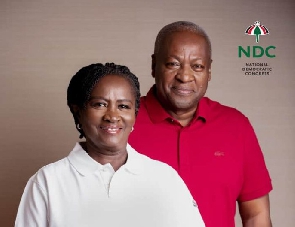Opinions of Monday, 12 January 2009
Columnist: Amenyo, Kofi
Can the NPP ever elect a non-Twi speaker as flag-bearer?
The answer, as at now, is an emphatic NO! As one forumer put it the other day, it is like asking a pig to fly. He could have said asking an elephant to fly. The historical evidence and the seemingly democratic way the party elects its leader will combine to ensure that a non-Twi speaker is never elected.
The NPP are the true heirs of the Busia-Danquah tradition. This tradition, from its inception, has been a thoroughly Twi project. The dominant characteristic of the tradition should not be seen in its ideological disposition (oh, that is just a smokescreen) but in the tribal background of those who effectively control it. The tradition was formed by Ashanti and Akyem Twi speakers whose primary commitment, even if they didn’t state it openly, was to themselves and the tribal traditions from which they came. We were still years away from independence and it was very convenient for them to couch their agenda in the name of a quest for national independence. It would be necessary for them to add other parts of the colony to their movement. Dombo was involved but it was clearly, as Okoampa-Ahoofe would say about Aliu Mahama, just to be given a ride. Today, Dombo’s name is almost forgotten from the tradition. When the Twi-dominated UGCC was forced to bring in Nkrumah, it was because there were few educated Gold Coasters at that time and they needed to show a semblance of national inclusiveness. It was never their intention to let the upstart from Nzema upstage them and they later rued the day they invited him.
In their frustration at Nkrumah’s successes, they sought to derail the process of independence in order to buy more influence for themselves and the chiefs who were their backers. When that failed, they tried to tear themselves away (matemeho) or get our small country of 5 million to be a federal one. But Nkrumah was always a step ahead of them. The fact that he came from a minority tribe helped him to project a greater sense of national belonging on the people. He didn’t have any powerful chiefs to account to and it was easy for him to curb the powers of the chiefs.
The tradition was greatly weakened after independence. J. B. Danquah stood no chance against Nkrumah in national elections. Nkrumah, admittedly, would become more repressive. Danquah did not need to die in prison just as Rawlings’ “revolution” did not need to kill those former heads of state. When Busia came back from exile, he would continue exactly where they left off. The non-Twi speaking fellow travellers of the tradition had now been dropped off. With his Twi-speaking cohorts in the Progress Party, Busia would re-emphasise the Ashanti-Akyem (pure breed) characteristics of the tradition and tribalism would increase with the deterioration of the national economy.
The military interregnum after Busia would be headed mostly by Twi speakers. These were military men who cannot be saddled with the tribal bias of any political tradition. It was what the Busia-Danquah tradition did when politics were allowed again that is of interest here. The Popular Front Party was basically a Twi outfit. There were other Ghanaians in the party but they were all there “just for the ride”. The Twi organisation quickly elected a Twi (Victor Owusu) as its leader. Even when a splinter group was formed, it was clearly a Twi house divided against itself. The UNC was led by Paa (Osu Cemetery) Willie.
Then Rawlings made his coup and imposed himself on us for 11+8 years. The Busia-Danquah tradition went into hibernation. When civilian politics were allowed again in 1992, they were ready with the same Twi setup as before. If you thought they would change their ways, then you failed to read the runes correctly. They just dusted off the old script and Adu Boahen was elected as flag-bearer. The top positions in the party were occupied by Twi speakers with a few lower posts tossed to the “others” as a sop. The real power brokers remained, as usual, Twi speakers. Adu Boahen would stand no chance against an incumbent Rawlings. The chance for the Busia-Danquah tradition to shine again came when Rawlings left the scene. They would not depart from their beloved old script. An Ashanti and Akyem would battle it out for the leadership. The Ashanti man won, the Akyem man bided his time, non-Twi speaking Ghanaians looked on. The same scene would replay itself again in 2008 with a slight change in the dramatis personae. The script had not yet been fully acted out. An Akyem man and an Ashanti man would fight again for the leadership. In very strange circumstances, the Akyem man won, the Ashanti man resigned from the party and was talked back into it. He came back and is now also biding his time. The stage for 2012 has been set. There will be no revisions to the script. It will be a fight among Twi speakers again. Other Ghanaians who belong to the party can only sit aside and look on. They have always done so. In none of the previous fights did a non-Twi speaker even come close to winning.
The NPP has a democratic way of electing its leader. It won’t be allowed as a party if it didn’t. Its elections are supervised by the Electoral Commission which makes sure that due process is followed. Ironically, it is this democratic process which ensures that a Twi is always elected as leader. The tribal diversity of our country means that fully democratic processes do not necessarily ensure equity in other areas. The Ashanti Region is by far the largest in the country. The delegates only need to vote for one of their own to ensure victory for him especially in a crowded field. Add this large number of delegate votes to those of Eastern and Brong Ahafo regions (each supporting the same Twi speaking candidate) and the other candidates who have the backing of their tribesmen stand no chance. This is exactly what happened in the December primaries. The system could have worked to provide a winner who could come from anywhere if the party were not already heavily Twi biased to start with.
Even the tradition’s own think-tank reflects this tribal bias. We all saw the ignominious attempts of the “researchers” at the Danquah Institute to vilify polls conducted by others, not so much on account of their scientific inadequacies, but because they dared predict (rightly as it turned out to be) that Akufo-Addo would lose the impending elections. There is nothing wrong for a privately funded institution to be committed to a particular political idea, but when think-thank intellectualism presents itself from such a patently narrow tribal base then eyebrows must be raised. All the researchers at that institute carry name plates with Twi-sounding names on them!
The argument that it is still early days in the party’s life ignores the historical antecedents. Even if it is early days in the NPP, why is it not also early days in the NDC which was formed around the same time and has roughly a similar nomination process but could, within a space of eight years, move from an Ewe flag-bearer to a Fante one? The NDC, which in other aspects is really not a better party than NPP, is clearly not hemmed in by any moribund tribal-based traditions. The possibility of an Ashanti leading that party in the very next elections is very real. The same cannot be said of the NPP being led by a non-Twi speaker! Those who argue that the NPP cannot force non-Twi speakers to join it and take positions that will eventually lead to their success as flag bearers miss the point. It is true that, in a democracy, a party cannot force people to join it. But the party has a duty to make itself attractive to people of other tribes. This is what the NPP has failed to do. How can people of other tribes be attracted to a party which is controlled by a cabal of Twi-speakers and which can only elect Twi speakers as flag-bearer and where Twi is the preferred language of deliberation in the inner sanctum (fri ha, fri mi fie se wu tie die mi ka, fri ha)?
If you are a native Twi-speaker unable to see yourself from the outside, you won’t see these things because the status quo favours you. You will say that it is others who are bringing tribal divisions among us by talking of such things. But there is no denying the tribal diversity of our country and the need to talk openly about such things so that we can evolve solutions to them to our mutual benefit. We should not try to wish them away and pretend they don’t exist.
The Akans form the largest single tribal grouping in our country. Not only are they an integral part of Ghana, they are also a very important group. No one can deny that. At about 40 percent of our population, there is nothing wrong if a government headed by an Akan has about 50 per cent of its members coming from that group. But when the percentage is uppermost of 75, as was the case in the Kufuor regime, (with all the most important posts, both national and ambassadorial, being held by them), then there is cause for concern. No government in Ghana can make appointments without considering the ethnic balance of our country. That talk of the best man for the job is just a utopian ideal that is not necessary. After all, in today’s Ghana, there are qualified people from all tribes of the country and the best man can come from anywhere
That the only regions Akufo-Addo won in the first round were three Twi speaking ones (down to two in the run-off) must be a great source of worry to the high ranking party panjandrums. The party’s ethnic bias has been exposed as never before. There is nothing wrong if a party has its support base in certain areas of the country but when that base is coterminous with a tribal group, in a country with such diversity as ours, then that base cannot sustain the party in the national interest for long. That is why the NPP must exert itself to wash off this stamp of ethnic bias by emerging from its narrow base to genuinely appeal to the wider mass of ALL Ghanaians. Can we see that change already in their leadership contest for 2012? We are all waiting with bated breaths...
Kofi Amenyo (kofi.amenyo@yahoo.com)












